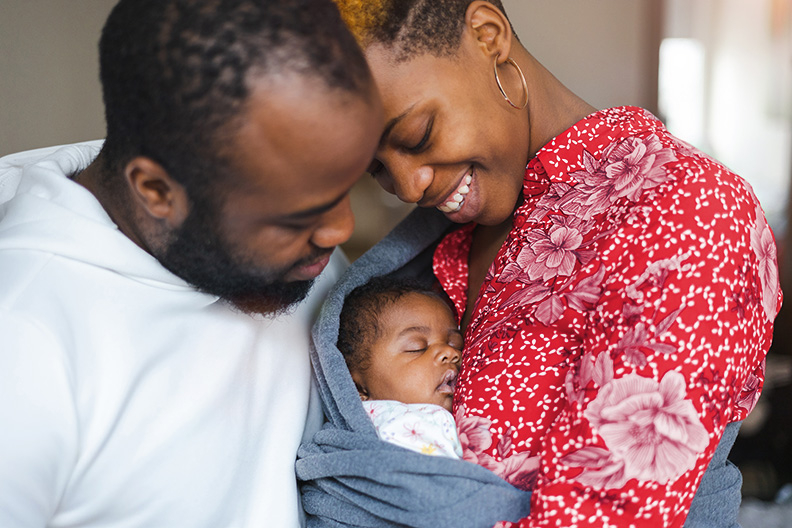
Special promotional content provided by Quartz Insurance.
Like most insurance companies, Quartz covers all the medical care it takes to give birth: the prenatal visits, ultrasounds, everything involved in the birth itself. That’s nothing new.
What is new, though, is that Quartz now covers the services of a doula – a trained birthing coach and advocate.
A doula is “really just another member of the care team, and they’re there for emotional support,” says Nicole Vesely, Quartz’s clinical services vendor program manager. “They’re there to help be an advocate for mom … They don’t have a clinical role, but they provide emotional and social support to our members.”
It can be difficult for a new mom to create a birth plan and stick to it when members of the care team have different ideas. The doula can be there just to consult early in the pregnancy to help craft the birth plan and offer advice for self-advocacy, or can be present all the way through the birth – and beyond. A doula can also provide support to families as they navigate life with a newborn.
Quartz spent last year testing the idea of offering doula services. The roughly 50 families who took advantage had positive review.
“What we’re hearing from these women is that the doulas have encouraged their confidence and skills in advocating for themselves,” says Robin Perry, a care coordinator at Quartz. “Historically in healthcare, people often felt there was only one choice—what their care team told them. Now, they feel supported to ask questions and make choices.”

A National Institute of Health study found that only about six percent of women had a doula involved in their pregnancy. The same study found that 27 percent of women wanted a doula but didn’t have one.
Other studies have shown tangible benefits: having a doula as a member of the birth team decreases the overall cesarean rate by 50 percent, the length of labor by 25 percent, the use of synthetic oxytocic (a drug that speeds labor up) by 40 percent, and requests for an epidural by 60 percent.
Those medical benefits are part of the reason Quartz wants more families to employ doulas, and why Quartz wants to treat doulas just like any other member of the care team.
“Our program is unique because our doulas will be submitting claims for their services, just like a doctor or dentist would, through the same type of system,” Perry says.
Doulas can also be instrumental in advocating for women and families from traditionally underserved communities. For example, outcomes for Black mothers and newborns are far more likely to be negative than their white counterparts, almost entirely because of implicit, unconscious bias among care providers. An advocate can cut through those biases.
With that in mind, Quartz has intentionally partnered with organizations dedicated to closing those disparities.
“There is a reason that the Foundation for Black Women’s Wellness is one of our first partners in the doula space,” Perry says. “They have been instrumental in helping us build out this doula benefit so that it can serve even more women and birthing persons.”
“Even more” means a lot more – like, 70 times more.
In their first pilot year, Quartz did very quiet, targeted promotion, and provided doula services for about 50 births. This year the program is still technically in trial mode for 2025. For this year, doula services through Pacify are available virtually anywhere and in-person in Brown, Calumet, Columbia, Dane, Dodge, Door, Eau Claire, Fond du Lac, Iowa, Jackson, Jefferson, Juneau, Kenosha, La Crosse, Manitowoc, Milwaukee, Outagamie, Ozaukee, Racine, Rock, Sauk, Sheboygan, Vernon, Washington, Waukesha and Winnebago counties in Wisconsin and Hennepin and Ramsey Counties in Minnesota. Umama Birthing doulas are available in-person in Dane and Rock Counties in Wisconsin.
Eventually, if the trials continue to succeed, Quartz would love to provide a doula for every one of the 3,500 births Quartz covers in a year.
“The ultimate goal of this program is that if we have anybody who is a Quartz member that wants a doula, we can get them a doula,” Perry says.
There’s also a broader mission: more coverage of doula services means more funding for more people to become doulas, and more availability for women and families.
“We also want to support growth. Working with organizations like the Foundation for Black Women’s Wellness and Pacify, we’re seeing their networks of doulas grow quickly, which expands access for our members,” Vesely says.
Quartz also hopes to lead by example.
“We are hopeful that someday we see everybody in every state who is a birthing person have the ability to have a doula covered by their insurance plan,” Perry says. “Our goal is partially to continue to educate. What is a doula? How can they be beneficial?”
To learn more about Quartz’s coverage of pregnancy and birth services, and to connect with a doula through Quartz, visit QuartzBenefits.com/Baby.



